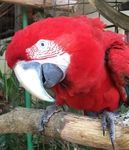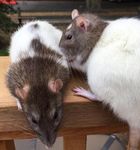Pet Safety after Solid Organ Transplantation - BC Children's ...
←
→
Page content transcription
If your browser does not render page correctly, please read the page content below
Pet Safety after Solid Organ Transplantation
Pets are a great source of comfort and support to children with organ failure and after a
transplant. People with organ failure have often had many negative health experiences
leading up to the transplant, and the bond with a pet can be important to reduce stress and
anxiety. Pets that need physical activity, such as dogs, can also
motivate people to become more active themselves, which is
good for both the pet and the human! The following information
will help you to maintain a safe and supportive relationship with
your pet.
People who have received organ transplants are more likely to
get infections in general. There are some types of diseases that
people can get from animals, even when the animal is not sick. It
is important to take some simple steps to reduce the risk of
getting sick after contact with animals.
Lexi
Keep clean!
It’s important to clean up after your pet, but it is better not to handle
feces (animal waste) directly if you can avoid it. If you don’t have a
choice, it is best to wear gloves to avoid direct soiling of your hands.
In addition to wearing gloves, wash your hands thoroughly with
running water and soap after handling animal waste. Adults should
supervise the hand washing of children.
Caring for your sick pet
If your pet is ill, take them to the veterinary clinic as soon as possible.
Mak
If your pet is sick, you should avoid touching your pet. If you have to touch your pet, wash
your hands immediately afterward. Any cat or dog that has diarrhea
should be checked by a veterinarian for infection with
Cryptosporidium, Giardia, Salmonella, and Campylobacter.
Pets should also be fully immunized to prevent infections. There is no
risk of transmission to humans following immunization of pets with
non-live vaccines. If your pet needs a live vaccine, such as an
intranasal live attenuated vaccine for Bordetella bronchiseptica
(kennel cough), you should not hold the pet during vaccination to
Jasper avoid direct contact with the vaccine. You should also pay extra
attention to avoid direct contact with your pet’s nose, mouth or face
right after vaccination.Caring for dogs
If you have a dog, have another person pick up dog feces (waste) if
possible. If you must handle dog feces yourself, wear disposable
gloves and wash your hands thoroughly with soap and water after
you remove the gloves. Seek medical attention if you get bitten by
any dog, including your own dog.
Caring for birds Dante
Bird droppings can contain germs that get
into the air and cause serious lung infections. Pet birds should be
kept outside of the home or in a room that you will not enter. They
should not be kept in your bedroom. If birds must be kept inside the
house, someone else must clean the cage lining every day. Routine
screening of healthy birds for zoonotic diseases is not
recommended.
Billy
Caring for fish
Like all animals, fish may carry germs that make people sick. These
germs can also contaminate the water in which fish live. Avoid
cleaning fish tanks by yourself; ask a family member or friend for
assistance. If this task cannot be avoided, you should wear disposable
gloves during such activities. Do not clean a fish tank if you have a
wound or an abrasion on your hands or arms. Wash your hands
thoroughly with running water and soap afterwards.
Caring for cats Max the shrimp
If you have a cat, have another person clean out the
kitty litter on a regular (daily) basis. Do not place litter boxes in kitchens,
dining rooms, or other areas where food is prepared and eaten. Keep your
cat indoors. Avoid keeping kittens at home if possible and especially avoid
getting scratched by kittens. Seek medical attention if you get bitten by a
cat.
LunaFeeding your pet
Just like people, pets can get diseases from eating contaminated food.
By protecting your pet from foodborne diseases, you can protect your
own health as well. Pets should be fed only high-quality commercial
pet foods. If eggs, poultry or meat products are given to your pet as
supplements, they should be well-cooked. Any dairy products given to
your pets should be pasteurized. Additionally, pets should be
prevented from drinking toilet bowl water and from having access to
garbage. Do not let your pet scavenge for food, hunt or eat other
animals' feces.
Leo
Animals to avoid
You should not handle wild animals or play with stray cats or
dogs. Don’t play with other people’s pets if you don’t know
the owner or the health status of that animal. Do not adopt
wild animals as pets or bring them into your home. Ensure
that areas near the home are free of raccoon latrines. Do not
handle rodents (hamsters, mice, rats), reptiles (lizards, snakes,
turtles) or baby chicks and ducklings. If you come into contact,
wash your hands thoroughly with running water and soap.
Bowren Mickey Moose
Visiting farms and petting zoos
You should be cautious when visiting farms and when in contact with farm animals, including
animals at petting zoos and fairs. If you are touching farm animals, you and your family
members should always wear gloves, and wash your hands thoroughly with soap and water as
soon as you remove the gloves.
Getting a new pet
You should check with your transplant coordinator if you plan to get a
new pet or plan on spending a lot of time around animals (working on a
farm, horse-riding, volunteering at an animal shelter). In some rare
situations, such as with unusual pets, you may also want to consult with
the infectious disease specialist. Consider waiting until you are on
stable-immunosuppression before getting a new pet.
LunaSome animals are considered high-risk for causing illness in people
with an organ transplant and should not be kept as pets. Willow
Pets to avoid include:
Rodents, including hamsters, mice, and pet rats.
Reptiles, including lizards, snakes, and turtles.
Baby chicks and ducklings.
Exotic pets, including monkeys. and Sage
You should avoid contact with these animals and their environments (including their food or
cage). If you come into contact, wash your hands thoroughly with running water and soap.
Other sources of information
More information on living safely with pets and other animals can be found at the following
websites:
http://www.bccdc.ca/health-info/prevention-public-health/animals-your-health
https://www.cdc.gov/healthypets/pets/index.html
https://en.projetlaurent.org Canadian research project about living safely with pets
after transplant
Featuring: Non-human friends of the BC Children’s Hospital transplant team!
References:
1. https://www.cdc.gov/healthypets/specific-groups/organ-transplant-patients.html
2. Avery, RK, Michaels, MG; on behalf of the AST Infectious Diseases Community of Practice.
Strategies for safe living following solid organ transplantation—Guidelines from the
American Society of Transplantation Infectious Diseases Community of Practice. Clin
Transplant. 2019.You can also read



























































